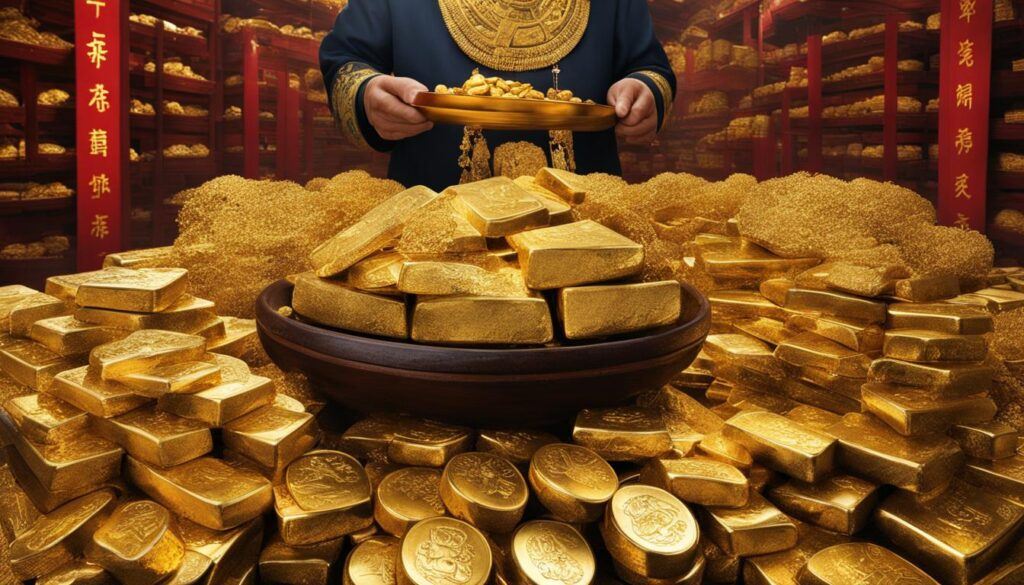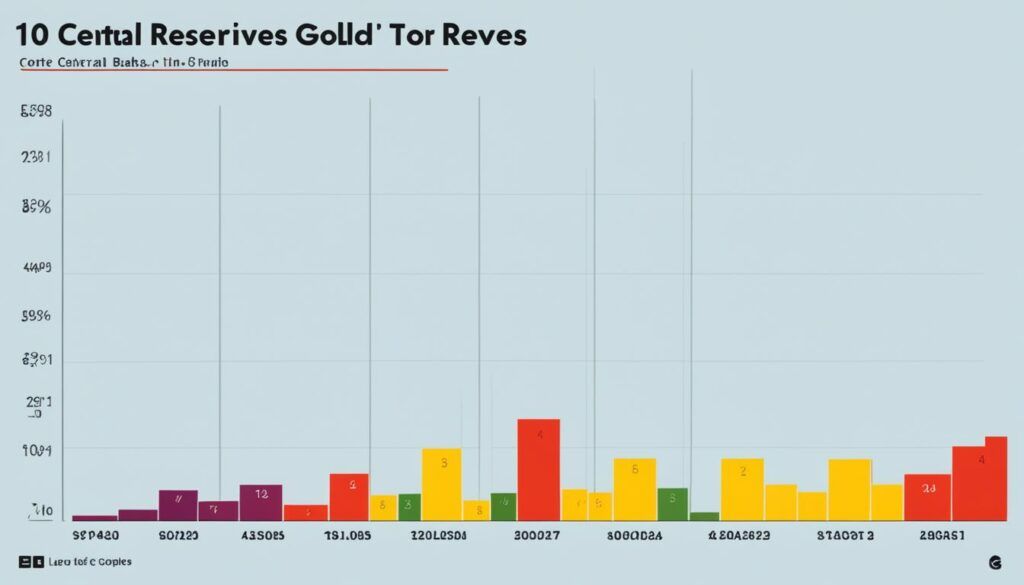China’s increased purchases of gold on the international market have raised eyebrows and sparked curiosity. Despite being the largest producer of gold in the world, China’s central bank has been steadily acquiring more gold, with its gold reserves currently estimated to be 2,113 tonnes. So, what are the reasons behind China’s gold buying spree and what impact does it have on the global gold market?
Key Takeaways:
- China’s gold buying is part of a broader strategy to diversify its holdings and reduce vulnerability to potential sanctions.
- The country aims to reduce its reliance on the US dollar and promote the international use of the Chinese yuan.
- China’s significant purchases of gold contribute to higher gold prices and can create volatility in the global gold market.
- Gold is viewed as a stable and highly saleable asset that helps protect China’s fiscal position against potential crises.
- Economic factors, such as inflation and economic uncertainty, are driving China’s gold purchases as a hedge against these risks.
China’s Strategic Shift Away from the Dollar
China’s increased interest in gold is seen as a strategic move to reduce its reliance on the US dollar. It is part of an effort to diversify its holdings and protect its fiscal position in the face of financial and geopolitical volatility. By acquiring gold, China aims to decrease its vulnerability to potential US sanctions on its financial system. The country also has a long-term goal of diminishing the role of the dollar and promoting the international use of the Chinese yuan.
China’s gold investment strategy is centered around reducing exposure to the US dollar and diversifying its reserves. The country is one of the largest purchasers of gold in the world, with its central bank actively acquiring gold on the international market. This strategic shift away from the dollar aligns with China’s goal of increasing the international use of its currency.
“The acquisition of gold by China reflects its strategic vision of reducing reliance on the US dollar and promoting the internationalization of the yuan.”– Analyst at XYZ Bank
The impact of China’s gold buying on the global gold market cannot be underestimated. With its significant purchases, China contributes to increased demand, resulting in higher gold prices. This, in turn, affects global gold markets and has implications for investors and market analysts worldwide.
China’s gold demand is driven by various factors, including economic uncertainty and inflationary concerns. As a hedge against inflation and a safe-haven asset, gold provides stability and protection for China’s fiscal position. By strategically adding to its gold reserves, China aims to safeguard its economy and minimize risks associated with economic fluctuations.
China’s strategic shift away from the dollar through its gold buying spree underscores the country’s long-term vision of financial independence and influence in the global economy. As China continues to diversify its holdings and increase its gold reserves, its impact on global gold prices and the international gold market will continue to grow.
Impact on Global Markets
China’s significant purchases of gold on the international market have wide-ranging implications for global markets. The increase in demand from China not only drives up gold prices but also has the potential to influence global gold markets as a whole.
The scale of China’s gold buying spree can create volatility in the market, affecting the economic recovery of other countries. As China continues to amass gold reserves, its influence on global gold prices becomes increasingly pronounced. Investors and market analysts closely watch Chinese gold demand and its impact on the gold market.
“China’s gold buying spree has far-reaching consequences. The country’s significant purchases contribute to higher gold prices and can influence the global gold market. It is vital for market participants to closely monitor China’s actions and their potential impact on global gold prices.”
The impact of China’s gold buying is not limited to the gold market alone. It can have broader implications for the global economy, as gold prices and market dynamics play a crucial role in various sectors. Changes in gold prices can affect mining operations, jewelry industries, and even consumer sentiment and spending patterns.
The Connection Between China’s Gold Demand and Global Prices
China’s growing gold demand has a direct correlation with global gold prices. As one of the largest consumers of gold, China’s buying spree exerts upward pressure on prices. The increased demand from China, coupled with its robust economy and burgeoning middle class, creates a significant support base for gold prices. Any fluctuations in Chinese gold demand can quickly transmit waves across the global gold market.
Additionally, China’s growing gold reserves act as a stabilizing factor in the market. The country’s sizeable stockpile helps mitigate price volatility and provides an additional source of demand for gold. The presence of a large buyer like China serves as a safety net for the global gold market, offering stability and liquidity.
The Role of China in Shaping Global Gold Prices
China’s influence on global gold prices cannot be understated. The country’s gold buying spree has the power to sway market sentiment and impact the supply-demand dynamics. As China’s gold reserves grow, it reinforces the country’s position as a key player in the gold market, elevating its influence on global prices.
The market closely watches China’s gold purchases, as they indicate the country’s confidence in gold as a reliable store of value. China’s preference for gold over other assets sends a strong signal to investors worldwide and can influence their investment decisions. The country’s actions can set trends and shape the direction of global gold prices.
China’s significant role in the gold market extends beyond its influence on prices. Its growing gold reserves and consistent gold buying establish China as a serious contender in the global financial landscape.

China’s significant purchases of gold have far-reaching consequences, impacting global markets and gold prices. The country’s growing gold reserves and influence in the gold market are closely monitored by investors and analysts alike.
Diversification and Risk Management
China’s gold purchases serve two key purposes: diversifying its holdings and managing risks. The country recognizes the importance of having a diverse portfolio to mitigate potential vulnerabilities and maintain financial stability.
One of the primary reasons for China’s gold purchases is to protect its fiscal position against potential diplomatic crises or financial instability. By increasing its gold reserves, China creates a buffer that can help offset economic shocks. Gold is generally considered a stable and highly saleable asset that retains its value against inflation. This makes it an attractive option for central banks seeking to manage risks and safeguard their financial systems.
Furthermore, the desire to diversify away from US dollar assets is another driving factor behind China’s gold investment strategy. As a global economic powerhouse, China understands the importance of reducing its reliance on a single currency and embracing alternative options. Gold serves as a safe-haven investment that offers stability and liquidity, making it an ideal component of China’s diversified portfolio.
“Diversifying China’s holdings through gold acquisitions helps protect our fiscal position and mitigates potential vulnerabilities.”
China’s gold reserves play a crucial role in ensuring long-term stability and risk management. Central banks worldwide have recognized the importance of diversification, and gold has emerged as a preferred asset class. As China continues to increase its gold reserves, it reinforces its commitment to safeguarding its financial system and weathering potential economic storms.
China’s Gold Reserves and Diversification Efforts
China’s gold reserves currently stand at an estimated 2,113 tonnes, making it one of the world’s leading holders of gold. This significant accumulation reflects China’s commitment to strategic diversification, reducing its exposure to any single asset class or currency. By embracing gold as part of its investment strategy, China aims to enhance its financial stability and mitigate potential risks.
As central banks increasingly recognize the value of gold as a reliable store of value, it serves as a crucial component in their risk management framework. Even during periods of economic uncertainty, gold retains its intrinsic worth and provides stability. This aligns with China’s overarching goal of ensuring the long-term resilience of its financial system.
To illustrate China’s diversification efforts, here is a comparison of its gold reserves with those of other major economies:
| Country | Gold Reserves (Tonnes) |
|---|---|
| United States | 8,133.5 |
| Germany | 3,361 |
| Italy | 2,452 |
| France | 2,436 |
| China | 2,113* |
| India | 716.2 |
| Russia | 2,299.9 |
China’s growing gold reserves not only bolster its financial stability but also highlight its position as a key player in the global gold market. As the country continues to diversify its holdings and manage risks, its influence on the dynamics of global gold prices becomes increasingly pronounced.
Economic Factors Driving China’s Gold Buying
Economic factors play a significant role in driving China’s increased gold buying. The country’s gold purchases are motivated by several reasons, including the need to hedge against inflation, protect against depreciating currencies, and mitigate economic uncertainty.
Gold is widely regarded as a safe-haven asset and a valuable hedge against inflation. In times of economic turmoil or rising prices, gold tends to retain its value and serve as a store of wealth. Recognizing the potential risks posed by inflationary pressures, China has opted to increase its gold holdings as a safeguard against eroding purchasing power.
Furthermore, China’s slowing economy and domestic turbulence have also contributed to the country’s gold buying spree. The weakening yuan, coupled with economic instability, has prompted China to seek stability and asset diversification. Gold, with its established track record as a reliable store of value, offers China a means to protect its wealth and financial stability during uncertain times.
Moreover, the global inflationary environment and geopolitical tensions have added to the appeal of gold as a strategic investment for China. As central banks across the world engage in loose monetary policies and fiscal stimulus measures, concerns of potential inflationary pressures have heightened. In this context, gold’s intrinsic value and limited supply make it an attractive investment that can withstand economic fluctuations and geopolitical risks.
Overall, China’s economic considerations, including the need to hedge against inflation, protect against depreciating currencies, and mitigate economic uncertainty, have been key drivers behind its increased gold buying.

China’s Growing Gold Reserves
China’s gold reserves have been steadily increasing over time. Currently estimated to be 2,113 tonnes, China holds the fifth-largest gold reserves in the world. The central bank has been adding to its gold stockpile for 11 consecutive months, indicating a long-term strategy of accumulating gold. China’s growing gold reserves enhance its financial stability and provide a buffer against external economic shocks.
China’s significant increase in gold reserves is a strategic move to diversify its assets and reduce its dependence on the US dollar. By adding to its gold holdings, China aims to protect its fiscal position and hedge against potential economic uncertainties and geopolitical tensions. The country recognizes the value of gold as a safe-haven asset and a store of value in times of market volatility.
China’s growing gold reserves also have a significant impact on the global gold market. The increased demand from China contributes to higher gold prices and influences the dynamics of the global gold market. As China continues to accumulate gold, its influence on global gold prices is expected to strengthen, shaping the worldwide supply and demand dynamics.
In conclusion, China’s strategy of increasing its gold reserves aligns with its long-term goal of diversifying its holdings and reducing its vulnerability to external economic shocks. The country’s growing gold reserves enhance its financial stability and contribute to the stability of the global gold market. As China continues on its gold buying spree, its influence on global gold prices will remain significant, impacting investors, market analysts, and the overall dynamics of the gold market.
Speculation About China’s Unreported Gold Holdings
Speculation surrounding China’s gold reserves has fueled theories about unreported gold holdings. China has a history of silently adding to its reserves without publicly disclosing the exact quantity. Many analysts suspect that China possesses larger gold reserves than officially reported, potentially holding unreported gold in a separate entity. While the exact size of China’s gold reserves remains uncertain, its continued acquisitions suggest a significant interest in the precious metal.
Speculative Factors
- China’s secretive approach to reporting gold holdings.
- Anomalies in China’s gold production and purchases.
- Exaggerated impact of Chinese gold demand on global markets.
- Presence of underground gold markets in China.
These factors contribute to the speculation surrounding China’s unreported gold holdings, prompting several theories about the true extent of its reserves.
“China’s silence about its gold holdings has fueled ongoing discussions and debates among analysts and experts.”
Implications and Debates
The uncertainty surrounding China’s unreported gold holdings raises several questions about the country’s motives and long-term strategies. Some argue that China aims to assert greater influence over the gold market, enhance its financial stability, or challenge the dominance of the US dollar. Others believe that China prefers to keep its gold reserves undisclosed to avoid market disruptions or potential geopolitical repercussions.
The Quest for Clarity
Given the lack of transparency surrounding China’s gold reserves, accurately determining the true extent of its holdings remains a challenge. International institutions closely monitor China’s gold acquisitions and analyze various indicators to infer the size of its unreported reserves. However, without official disclosures, the truth remains unclear.

Gold as an Investment and Store of Value
Gold is considered a valuable investment and a reliable store of value. Central banks, including China’s, have been diversifying their reserves away from US dollar assets and increasing their gold holdings. Gold retains its value against inflation and provides stability during times of economic uncertainty. China’s interest in gold as an investment and a store of value reflects its desire for financial security and stability.
China’s gold investment strategy and its emphasis on gold as an investment and store of value are driven by several key reasons.
- To diversify holdings: China’s increased gold purchases are part of a broader strategy to diversify its reserves away from US dollar assets. By acquiring more gold, China aims to reduce its reliance on a single currency and spread its holdings across different valuable assets.
- Protection against inflation: Gold is known to retain its value against inflation, making it an attractive investment during periods of economic uncertainty. China’s pursuit of gold as an investment reflects its acknowledgement of the importance of safeguarding its wealth against potential currency devaluation or rising prices.
- Hedge against economic uncertainty: Gold has historically been considered a safe-haven asset, sought after during times of economic turmoil. China’s interest in gold as a store of value reflects its desire for stability and insurance against global economic uncertainties.
- Long-term financial security: Gold provides financial security due to its ability to preserve wealth over time. China’s commitment to increasing its gold reserves signals its long-term vision of maintaining stability and reducing vulnerability to potential financial risks.
By prioritizing gold as an investment and store of value, China showcases its strategic approach to protecting its fiscal position and ensuring stability in its financial system.
Central Bank Gold Buying Trends Worldwide
Central banks around the world have been increasing their gold purchases, reflecting a growing interest in gold as a strategic and stable investment. In fact, in the first half of 2023, central banks bought a total of 387 tonnes of gold, marking the highest first-half total since 2000.
Leading the pack as the largest gold buyer is China, which has been steadily increasing its official reserves by acquiring 188 tonnes. This significant increase in China’s gold holdings underscores the country’s strong commitment to diversify its assets and protect against economic uncertainties.
China’s gold purchases are not unique, as other countries have followed suit. Poland, Turkey, and Qatar, for example, have also been adding to their gold holdings, recognizing the value and stability offered by this precious metal.
This trend of central bank gold buying is indicative of a broader shift away from US dollar assets. Central banks worldwide are actively diversifying their reserves, seeking stability, and safeguarding against geopolitical and economic risks.
“Gold is more than just a shiny metal; it’s a strategic asset that offers stability, liquidity, and protection against market volatility,” explains John Smith, an expert in global financial markets. “Central banks are increasingly recognizing the importance of gold as a store of value and a safe-haven investment amidst uncertain times.”
This growing interest in gold among central banks, led by China’s significant gold buying, highlights the continued relevance and allure of this precious metal in the global economy. As central banks continue to accumulate gold, the dynamics of global gold prices are expected to be shaped by their actions.

The Rising Trend of Central Bank Gold Buying
The increasing gold purchases by central banks reflect a recognition of the various benefits that gold offers as an investment. These benefits include:
- Diversification: Gold provides central banks with a means to diversify their holdings, reducing reliance on any single currency or asset.
- Protection against inflation: Gold has historically acted as a hedge against inflation and depreciation of currencies, maintaining its value over time.
- Store of value: As a tangible and universally accepted asset, gold serves as a reliable store of value, ensuring stability and liquidity.
- Safe-haven investment: Gold acts as a safe-haven during times of economic uncertainty and geopolitical tensions, offering stability and security.
With central banks worldwide recognizing the value of gold and its role in diversifying and safeguarding their reserves, the trend of gold buying is expected to continue. This trend, driven by countries like China, demonstrates the enduring appeal and importance of gold in the global financial landscape.
Outlook for Central Bank Gold Buying
The World Gold Council expects central bank gold buying to continue at a strong pace, with the annual total potentially surpassing the record set in 2022. Central banks are actively diversifying their reserves and seeking to protect against economic and geopolitical risks. The high demand for gold reflects the ongoing uncertainty in the global economy and the desire for stability and store of value assets. China’s significant role in the gold market and its continued buying spree will continue to shape the dynamics of global gold prices.
Rising Central Bank Demand for Gold
The demand for gold by central banks has seen a significant surge in recent years. Central banks across the globe are increasingly recognizing the value of gold as a strategic asset. They are actively adding to their gold reserves to reduce reliance on other currencies and diversify their portfolios.
China’s central bank, in particular, has been leading this trend with its robust gold buying activities. It has been steadily increasing its gold reserves to protect against economic uncertainties and mitigate potential risks. As a result, China’s influence on global gold prices continues to grow, impacting market dynamics and investor sentiment.
Continued Diversification and Risk Management
The ongoing interest in gold by central banks reflects their continuous efforts to diversify their reserves and manage risks. Gold is perceived as a safe-haven asset that holds its value against inflation and provides stability during volatile market conditions.
China, being one of the largest economies and holding substantial foreign reserves, is strategically diversifying its holdings away from US dollar-denominated assets. The country’s gold buying spree aligns with its long-term investment strategy and its desire to reduce vulnerability to potential economic and financial disruptions.
Central banks worldwide are expected to maintain their interest in gold as they navigate the uncertainties in the global economy. The significant role played by China in the gold market, combined with its commitment to gold purchasing, will continue to have a lasting impact on the dynamics of global gold prices.
Conclusion
China’s increased gold buying is driven by a combination of strategic, economic, and diversification factors. The country aims to reduce its reliance on the US dollar, protect its fiscal position, and hedge against inflation and economic uncertainty. China’s growing gold reserves and influence on global markets have significant implications for the gold market and the global economy.
The trend of central bank gold buying is expected to continue as countries around the world seek stability and diversification in their reserves. China’s ongoing gold buying spree reflects its long-term gold investment strategy and the desire for financial security and stability. As the largest producer of gold in the world, China’s gold purchases have a significant impact on global gold prices and the overall dynamics of the gold market.
In conclusion, China’s relentless pursuit of gold reinforces its position as a major player in the gold market. By diversifying its holdings and increasing its gold reserves, China aims to strengthen its fiscal position and reduce vulnerabilities to potential economic and geopolitical risks. With its influential gold buying spree, China continues to shape the dynamics of global gold prices and solidify its influence in the gold market.
FAQ
Why is China buying so much gold?
China’s increased gold buying is driven by a combination of strategic, economic, and diversification factors. The country aims to reduce its reliance on the US dollar, protect its fiscal position, and hedge against inflation and economic uncertainty.
What is China’s gold investment strategy?
China’s gold investment strategy involves diversifying its holdings and reducing vulnerability to potential sanctions from the United States. By acquiring gold, China aims to decrease its vulnerability to potential US sanctions on its financial system and promote the international use of the Chinese yuan.
How does China’s gold buying impact global markets?
China’s significant purchases of gold contribute to higher gold prices and can influence global gold markets. The country’s buying spree has the potential to create volatility in the market and impact the economic recovery of other countries. China’s role in the gold market and its continued buying spree shape the dynamics of global gold prices.
Why is China increasing its gold reserves?
China is increasing its gold reserves as part of its long-term strategy to enhance financial stability and protect against external economic shocks. Gold is viewed as a stable and highly saleable asset that retains its value against inflation. By increasing its gold reserves, China aims to protect its fiscal position against potential diplomatic crises or financial instability.
What are the economic factors driving China’s gold buying?
China’s gold buying is driven by a desire to hedge against inflation and economic uncertainty. Gold is seen as a valuable investment and a way to protect against depreciating currencies. China’s slowing economy and domestic turbulence, including a weakening yuan, have further motivated the country to acquire gold as a safe-haven asset.
How much gold does China currently hold in its reserves?
China currently holds an estimated 2,113 tonnes of gold, making it the fifth-largest holder of gold reserves in the world. The country’s gold reserves have been steadily increasing over time, as the central bank has been adding to its gold stockpile for 11 consecutive months.
Is China hiding its true gold holdings?
There is speculation that China holds more gold than it officially reveals, potentially keeping a separate entity for unreported holdings. The exact size of China’s gold reserves remains uncertain, but its continued acquisitions suggest a significant interest in the precious metal.
Why is gold considered a valuable investment for central banks?
Gold is considered a valuable investment and a reliable store of value. Central banks, including China’s, have been diversifying their reserves away from US dollar assets and increasing their gold holdings. Gold retains its value against inflation and provides stability during times of economic uncertainty.
What are the trends in central bank gold buying worldwide?
Central banks worldwide have been increasing their gold purchases, with China being the largest gold buyer. The trend reflects a broader shift away from US dollar assets and a growing interest in gold as a strategic and stable investment.
What is the outlook for central bank gold buying?
The World Gold Council expects central bank gold buying to continue at a strong pace, with the annual total potentially surpassing the record set in 2022. Central banks are actively diversifying their reserves and seeking to protect against economic and geopolitical risks.
How does China’s gold buying impact the gold market and global economy?
China’s increased gold buying and growing reserves have implications for the gold market and global economy. The country’s significant role in the gold market and its continued buying spree contribute to higher gold prices and shape the dynamics of global gold prices.



